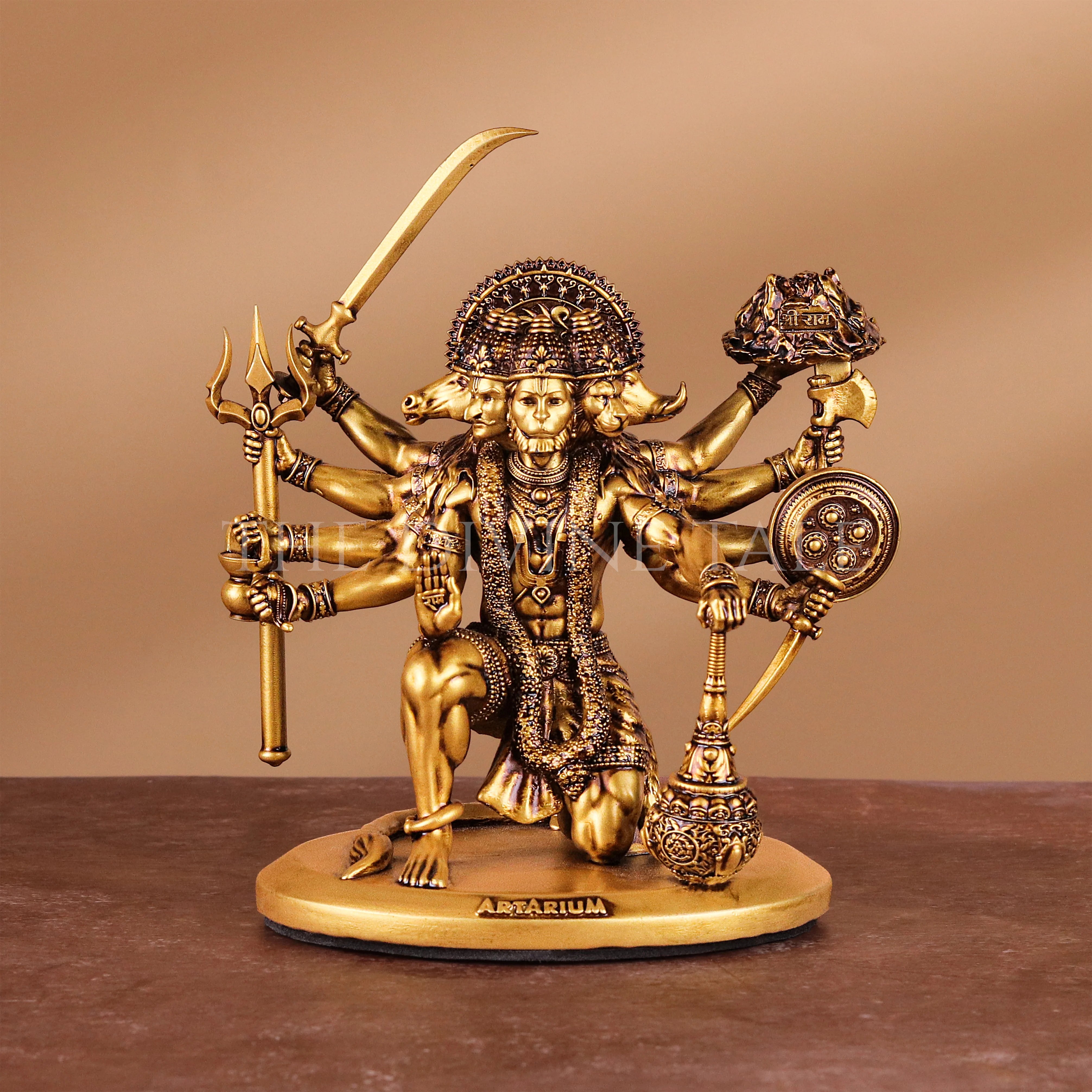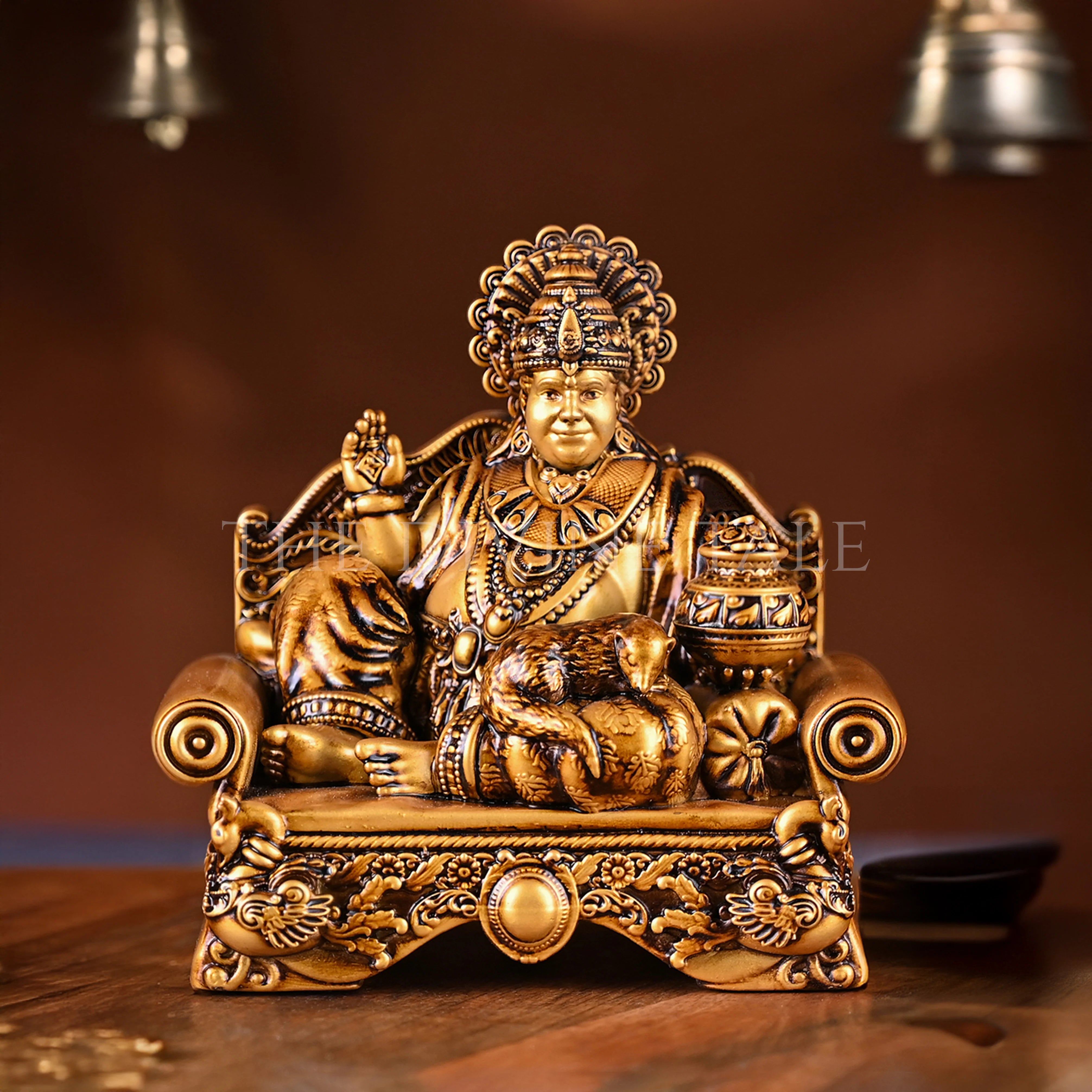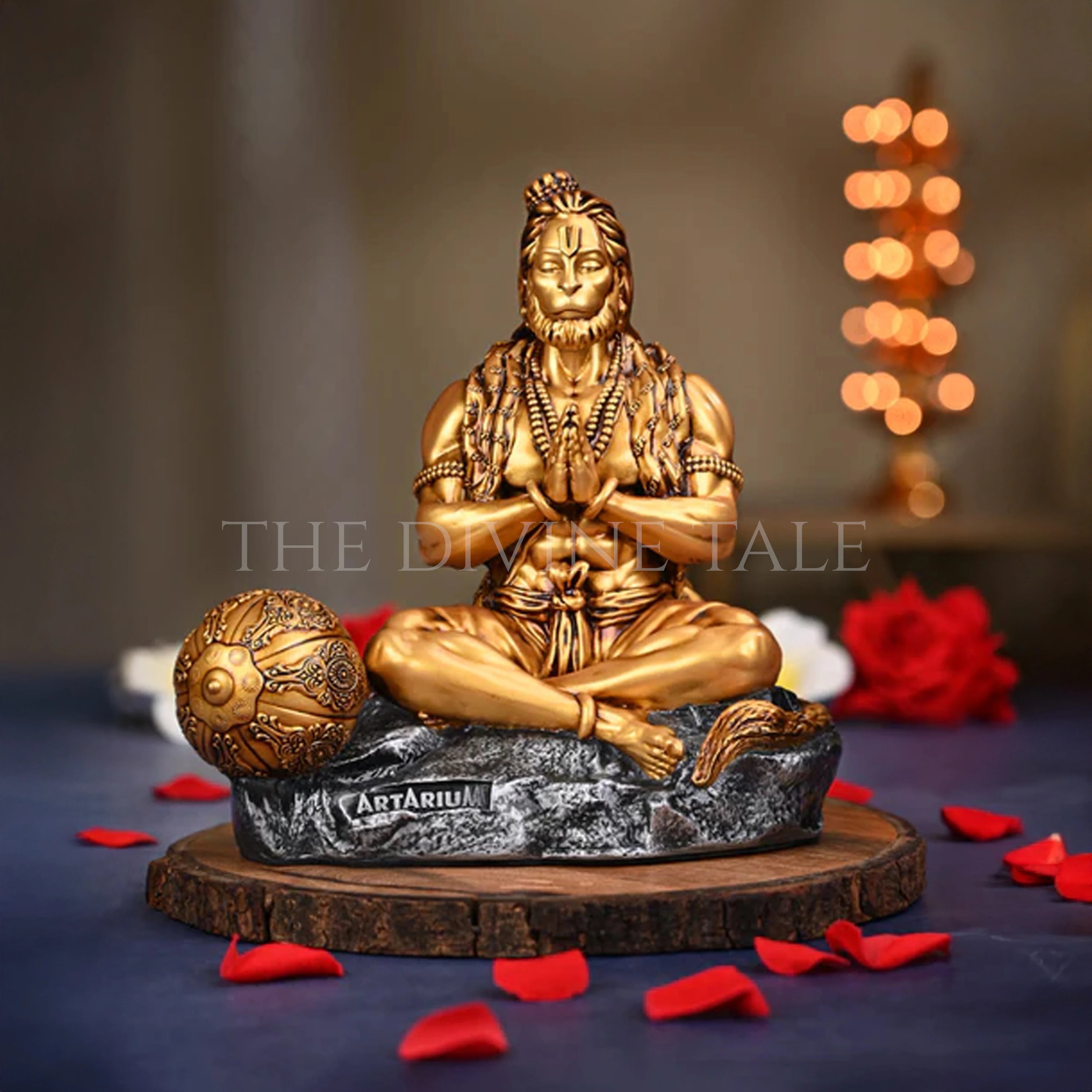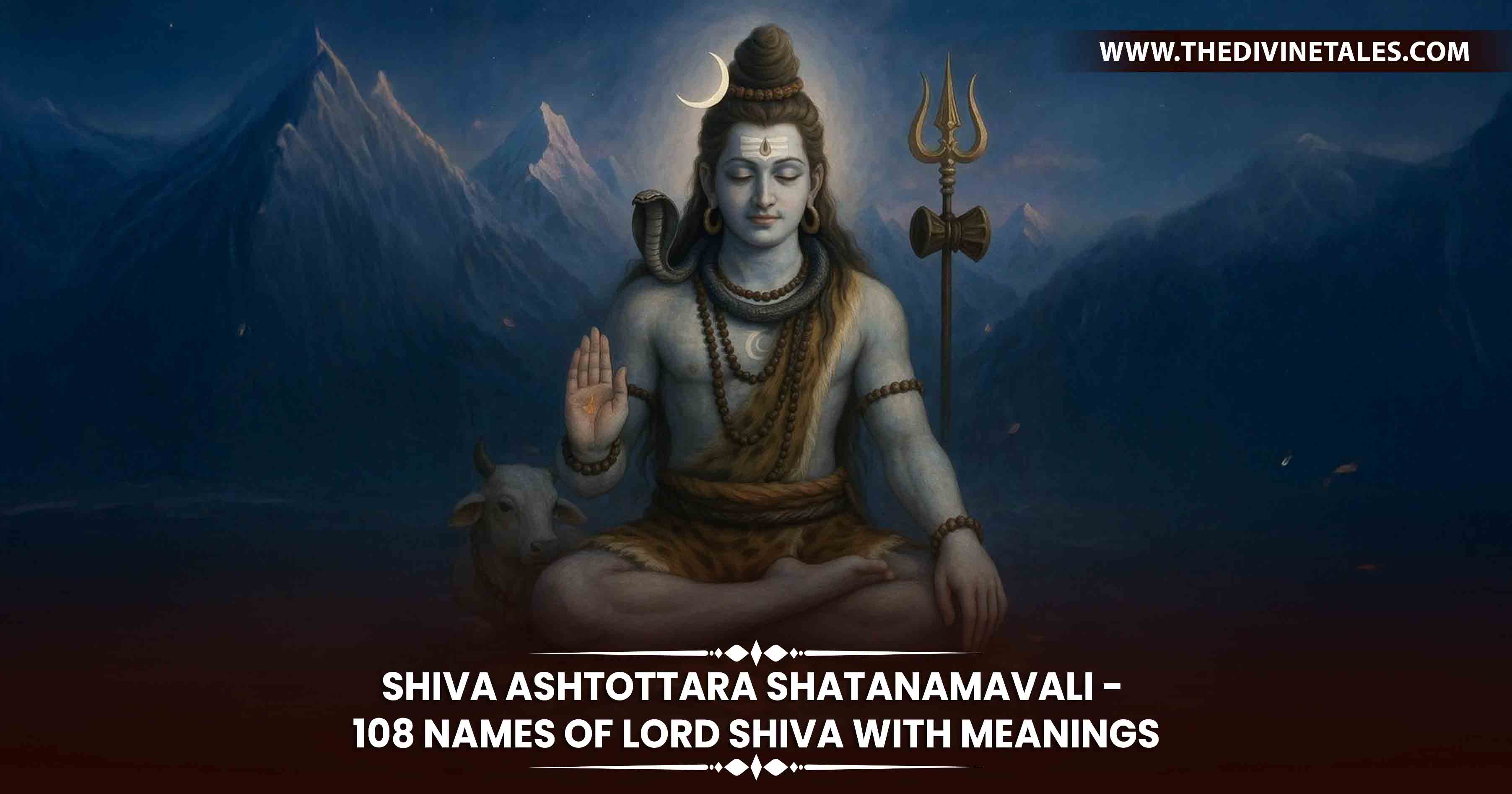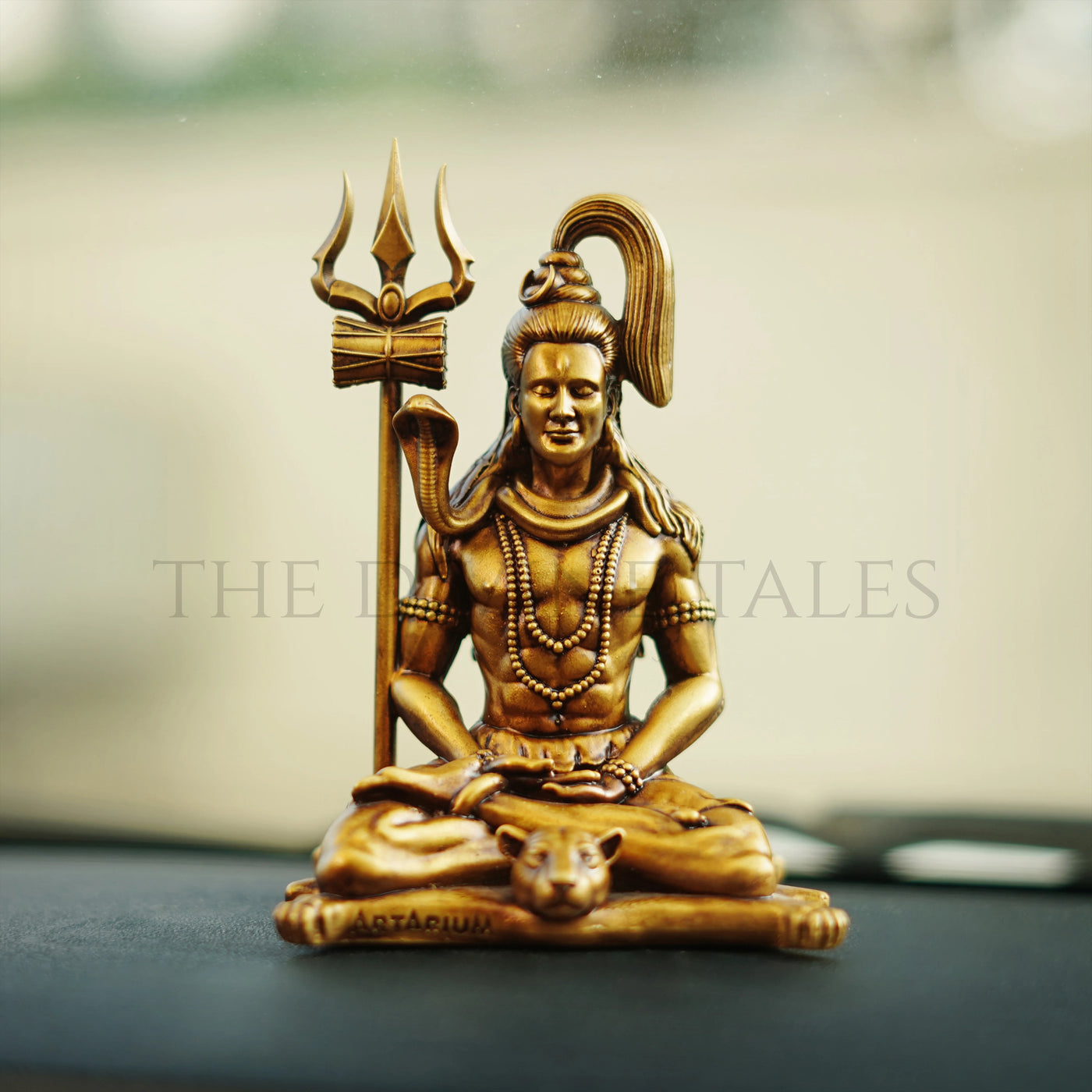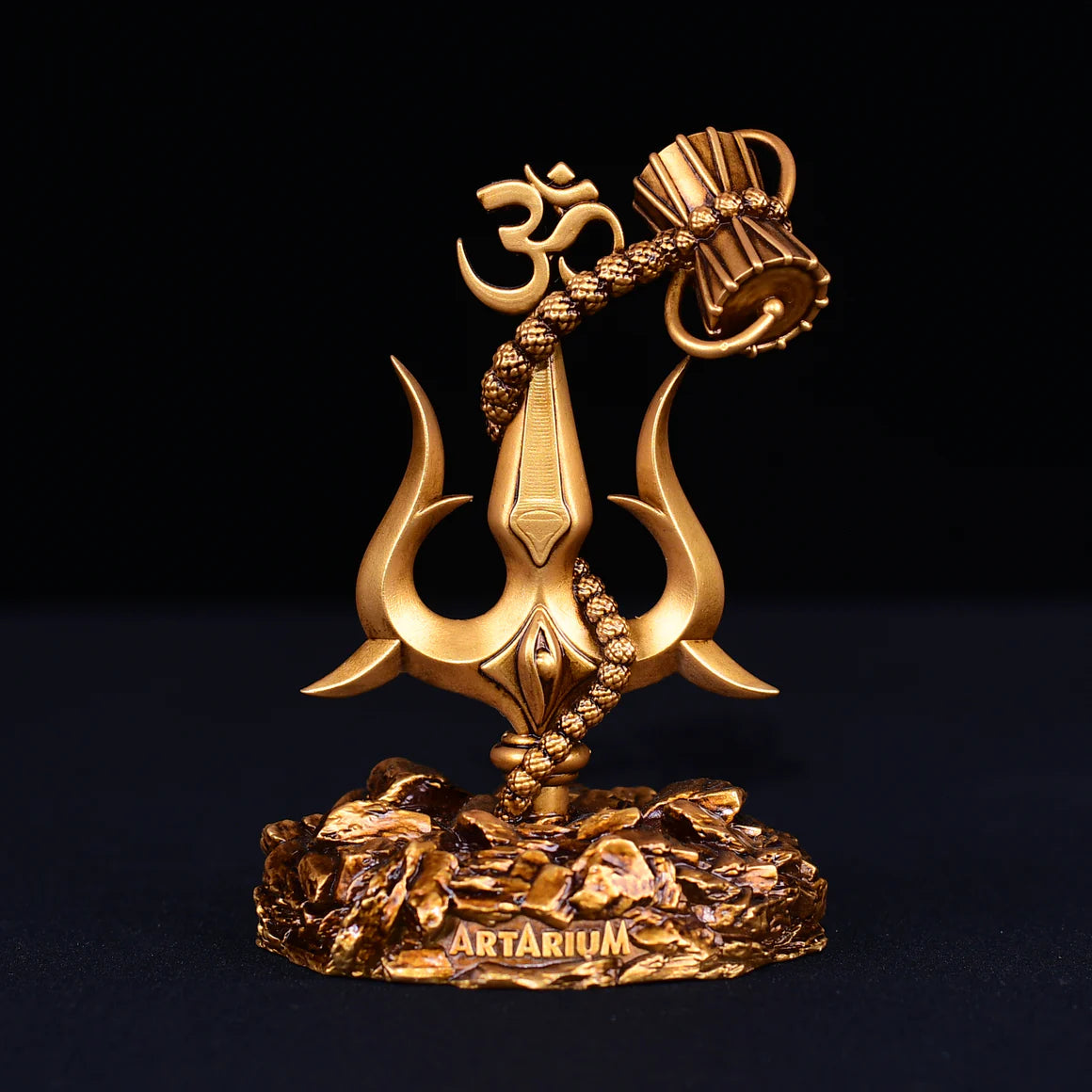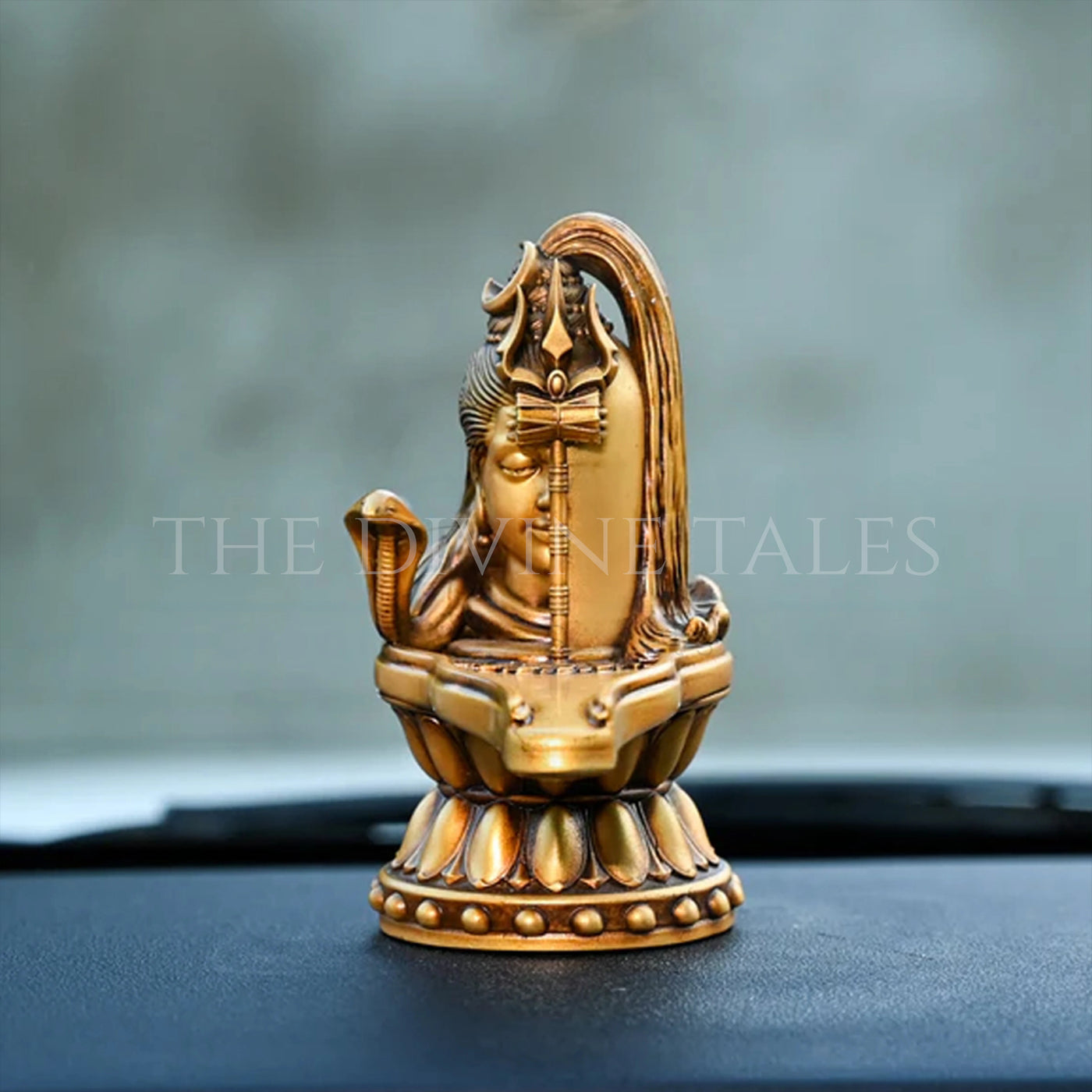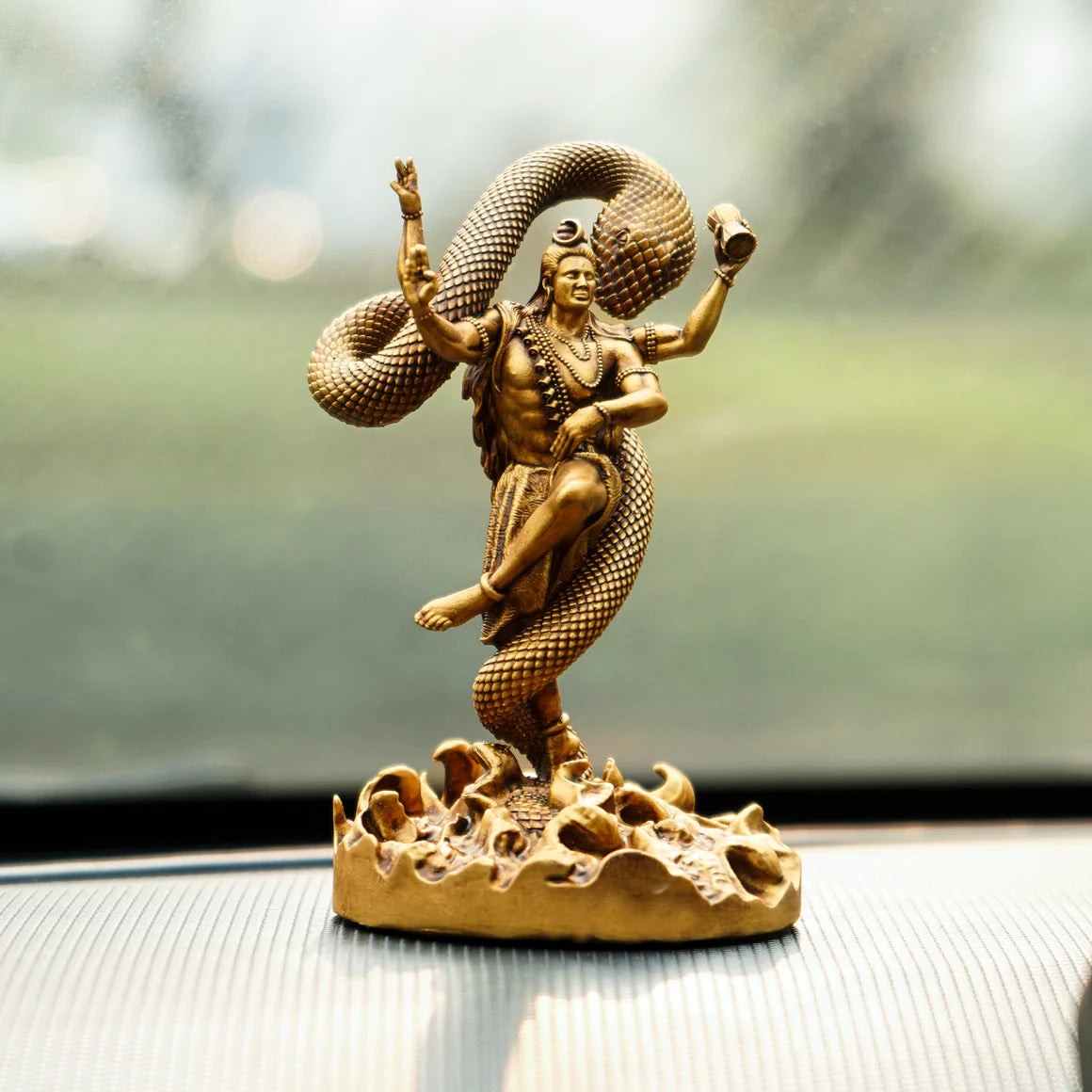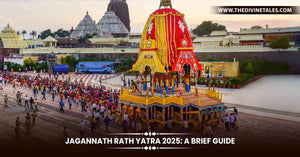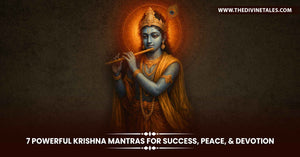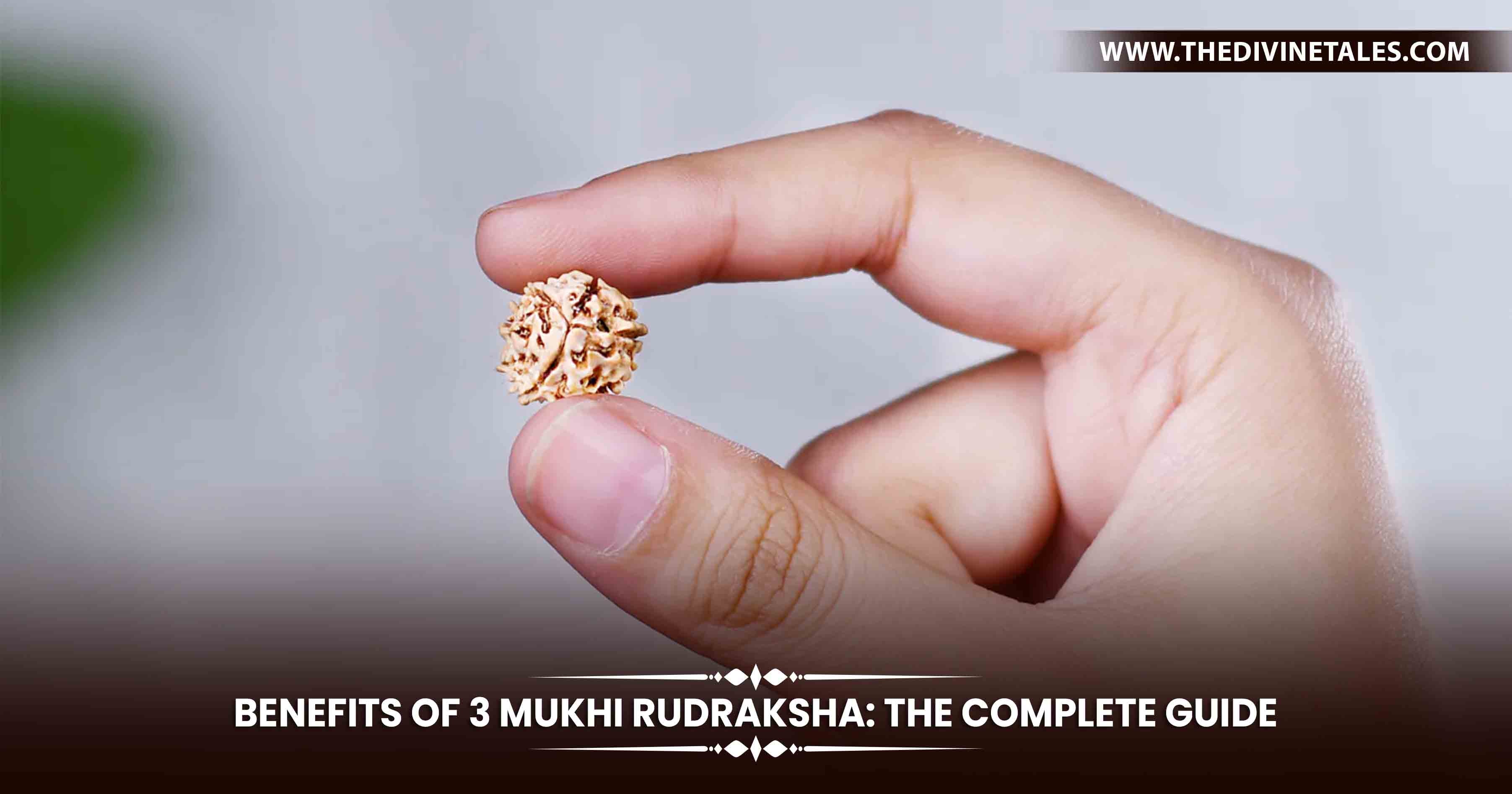Shiva, Mahadev or Shambhu - the god of destruction and transformation - is one of the principal deities in the holy Hindu trinity (trimurti) along with Brahma and Vishnu. He is known for his various aspects, wherein he’s sometimes depicted as benevolent in the form of an omniscient yogi living an ascetic life on Kailash parvat. Meanwhile, on the other hand, he’s seen as a fierceful power, ready to eradicate anything and anyone who disturbs the balance of the nature.
Along with the many aspects of his nature, shiva is also known by various different names that denote the various forms and essence of his personality. Here, in today’s blog, we will be discussing the 108 names of Lord Shiva and their meanings.
108 Names of Lord Shiva & their Meanings
|
S.no. |
Names |
Meanings |
|
1 |
Shiva |
The most auspicious one |
|
2 |
Mahesvara |
Lord of Gods |
|
3 |
Shambhu |
Bestower of wealth and prosperity |
|
4 |
Pinaki |
One who carries the bow, Pinaka |
|
5 |
Shashishekhara |
One who wears the crescent moon on his head |
|
6 |
Vamadeva |
Lord, who is pleasing and auspicious |
|
7 |
Virupaksha |
One with a third eye on the forehead |
|
8 |
Kapardi |
One with matted hair locks |
|
9 |
Nilalohitaya |
One who has a red and blue color complexion |
|
10 |
Shankara |
Bestower of happiness and prosperity |
|
11 |
Shulapani |
One who holds a trident |
|
12 |
Khatvangi |
Lord who carries a weapon called Khatvanga |
|
13 |
Vishnuvallabhaya |
The dear one of Lord Vishnu |
|
14. |
Shipivishta |
Lord, whose form emits powerful rays of light |
|
15 |
Ambikanatha |
Consort of goddess Ambika (Maa Parvati) |
|
16 |
Shrikantha |
One with a beautiful throat |
|
17 |
Bhaktavatsala |
One who immensely loves his devotees |
|
18 |
Bhava |
One who himself originated as a creation |
|
19 |
Sharva |
Destroyer of all the sins and sufferings |
|
20 |
Trilokesh |
Lord of all three worlds |
|
21 |
Shitikanthaya |
One with the blue throat |
|
22 |
Shivapriyaya |
Beloved of the goddess Parvati |
|
23 |
Ugra |
One with a supremely fierce nature |
|
24 |
Kapali |
One who wears a skull garland around his neck |
|
25 |
Kamari |
Enemy of Kamadeva |
|
26 |
Andhakasurasudana |
Lord, who killed the demon Andhaka |
|
27 |
Gangadhara |
Lord who holds Maa Ganga on his head |
|
28 |
Lalataksha |
One who has an eye on the forehead |
|
29 |
Kalakala |
One who is even the death of Kala (Yama) |
|
30 |
Kripanidhi |
The merciful lord |
|
31 |
Bhima |
One who’s strong like Bheema |
|
32 |
Parashuhasta |
Lord, who carries an axe |
|
33 |
Mrigapani |
One who holds the devotees’ minds as deer |
|
34 |
Jatadhara |
One with matted hair |
|
35 |
Kailasavasi |
One who resides on Kailasha parvat |
|
36 |
Kavachi |
The armoured one |
|
37 |
Kathora |
Extremely strong and powerful |
|
38 |
Tripurantaka |
Slayer of the demon Tripura |
|
39 |
Vrishanka |
God with a flag carrying the symbol of a bull |
|
40 |
Vrishabharudha |
One mounted on the bull |
|
41 |
Bhasmoddhulitavigraha |
One who applies ashes to his entire body |
|
42 |
Samapriya |
One who loves the Samaveda |
|
43 |
Svaramaya |
One who resides in all seven notes (swara) |
|
44 |
Trayimurti |
One who exists in the form of the Rigveda, Yajurveda, and Samaveda |
|
45 |
Anishvara |
The lord of all |
|
46 |
Sarvajna |
One who is omniscient |
|
47 |
Paramatma |
The supreme lord |
|
48 |
Somasuryagnilochana |
One with eyes in the form of the sun, moon, and fire |
|
49 |
Havis |
Personification of a sacrificial offering |
|
50 |
Yajnamaya |
Form of sacrifice (yajna) |
|
51 |
Soma |
One who’s calm and pure like the moon |
|
52 |
Panchavaktra |
One with five faces |
|
53 |
Sadashiva |
Eternally auspicious one |
|
54 |
Vishveshvara |
Lord of the universe |
|
55 |
Virabhadra |
One with an intense, fierce nature |
|
56 |
Gananatha |
Lord of all the ganas |
|
57 |
Prajapati |
The lord of all the beings |
|
58 |
Hiranyareta |
One who is as radiant as a thousand sun |
|
59 |
Durdharsha |
One who cannot be defeated |
|
60 |
Girisha |
Lord of Mountains |
|
61 |
Girisha |
One who sleeps on the Kailasha mountain |
|
62 |
Anagha |
One who hasn’t performed any sins |
|
63 |
Bhujangabhushana |
Lord who wears snakes as his ornaments |
|
64 |
Bharga |
Destroyer of all sins |
|
65 |
Giridhanva |
One who holds Mount Meru as his bow |
|
66 |
Giripriya |
One who is fond of mountains |
|
67 |
Krittivasa |
One who wears elephant skin |
|
68 |
Purarati |
Destroyer of the demon Tripurasura and his three worlds |
|
69 |
Bhagavan |
The supreme god |
|
70 |
Pramathadhipa |
Lord of pramatha ganas i.e., Shiva ganas |
|
71 |
Mrityunjaya |
One who conquers death |
|
72 |
Sukshmatanu |
Lord with a subtle body |
|
73 |
Jagadvyapi |
One who exists in the complete universe |
|
74 |
Jagadguru |
The perceptor of the universe |
|
75 |
Vyomkesha |
One whose hair spread in the sky |
|
76 |
Mahasenajanaka |
Father of lord kartikeya |
|
77 |
Charuvirkramaya |
The conqueror of beauty |
|
78 |
Rudra |
The one with a fearsome form |
|
79 |
Bhutapati |
Master of ghosts, spirits, and the pancha mahabhutas |
|
80 |
Sthanu |
The immovable and eternal lord |
|
81 |
Ahirbudhnya |
One who carries kundalini |
|
82 |
Digambara |
One whose garment is the sky |
|
83 |
Ashtamurti |
Lord, who has eight forms |
|
84 |
Anekatma |
God, who possesses many forms |
|
85 |
Sattvika |
One who is endowed with the eight gunas |
|
86 |
Shuddhavigraha |
The pure and clean soul |
|
87 |
Shasvata |
Eternal and endless one |
|
88 |
Khandaparashu |
One who carried a broken axe |
|
89 |
Aja |
The eternal one |
|
90 |
Pashavimochaka |
Lord who liberates from all worldly bondages |
|
91 |
Mrida |
One who grants happiness |
|
92 |
Pashupati |
Lord of animals |
|
93 |
Deva |
Lord of Devas |
|
94 |
Mahadeva |
Greatest of all gods |
|
95 |
Avyaya |
One who is never subjected to change |
|
96 |
Hari |
Same as Lord Vishnu |
|
97 |
Bhaganetrabhide |
The one who damaged Bhaga’s eye |
|
98 |
Avyaktaya |
One who is unseen |
|
99 |
Dakshadhvarahara |
One who destroyed Daksha’s conceited sacrifice (yajna) |
|
100 |
Hara |
The destroyer of all sins |
|
101 |
Pushadantabhide |
One who punished Pushan |
|
102 |
Avyagraya |
One who is stable and unwavering in nature |
|
103 |
Sahasrakshaya |
One with limitless forms |
|
104 |
Sahasrapade |
One who’s standing and walking everywhere |
|
105 |
Apavargapradaya |
Lord, who provides salvation |
|
106 |
Ananta |
One who is infinite |
|
107 |
Taraka |
The liberator |
|
108 |
Parameshwaraya |
The supreme god |
Benefits of Chanting 108 Names of Lord Shiva

Chanting the 108 names of lord shiva is believed to offer many spiritual and mental benefits including:
-
Relief from Stress and Anxiety: The rhythmic chanting of the different names of lord shiva can help ease down stress and calm your mind.
-
Better Concentration: Engaging in regular practice of chanting 108 names of Mahadev help improve focus so that you can better concentrate on your everyday tasks.
-
Sense of Strength and Power: Shiva is considered a powerful source of energy and wisdom and chanting different shiva names is believed to instill you with power and strength.
-
Flow of Positive Energy: The practice of chanting 108 names of Mahadev can creative a spiritually uplifting aura allowing the flow of positive energy.
-
Peace of Mind: The constant repetition of all names of god shiva, in a meditative state foster a deep connection with the divine and bring you peace of mind.
Read Also: 7 Study Table Decoration Ideas | 10 Most Powerful Gods in Hinduism
Takeaway
Shiva is the lord of all gods and the supreme diety responsible for the transformation and revival of the cosmos. There so much you can learn from shiva - like maintaining the calmness and mindfulness amidst the chaos and the need of proactivness and action to fight against the evil forces. Chanting the 108 names of Lord Shiva, not only helps invite his blessings but also adapt various of his personality traits that help you with your growth and betterment.
Frequently Asked Questions (FAQs):
Q. What is the unique name of Shiv Ji?
A. One of the most unique and powerful names of Lord Shiva is "Mahadev", which means the "God of Gods." While there are many different names of Lord Shiv, Mahadev carries this deep sense of respect and admiration.
Q. Why does Lord Shiva have different names?
A. The different names of Lord Shiva reflect various traits of his personality. He’s a destroyer, a protector, a yogi, a cosmic dancer, and a divine healer - hence, each of his 108 names help us connect with his varied sides.
Q. When is the best time to recite the 108 names of Lord Shiva?
A. While you can chant them anytime, early morning - especially during Brahma Muhurat (roughly between 4 - 6 AM) - is considered the most peaceful and spiritually charged time.
Q. Where can I find the 108 names of Lord Shiva in Sanskrit and English?
A. You can find the 108 names of Lord Shiva in many spiritual books or trusted devotional websites online. They’re usually listed as "Shiva Ashtottara Shatanamavali." A quick online search with that term will bring up versions in Sanskrit, English, and even Hindi.
Q. What is the significance of chanting the 108 Shiva names?
A. Each of the 108 names of Mahadev holds a special vibration and meaning. Chanting them helps us stay calm, focused, and spiritually connected. Many believed that chanting the different names of Lord Shiva regularly brings strength during hard times, clears negative thoughts, and fills the space around you with positive energy.
Q. What is the difference between names like Shiva, Shankar, and Bholenath?
A. All three are names of Lord Shiva, but each highlights a different quality:
- Shiva means "the auspicious one" – it’s his core name.
- Shankar means "one who brings happiness and peace."
-
Bholenath is probably the most loved - it shows his innocent, simple-hearted nature. People believe that he grants wishes easily because he’s not complicated or demanding.
Q. Can the 108 names of Lord Shiva be recited daily?
A. Yes. In fact, many people make it a part of their daily prayers. It doesn’t matter if you chant all 108 in one go or split them throughout the day. What matters is doing it with faith, love, and intention. Even listening to them daily can have a calming and grounding effect.
Also View - Goa Game
Read Also: 108 Unique and Different Names of Lord Krishna | 108 Names of Goddess Durga

